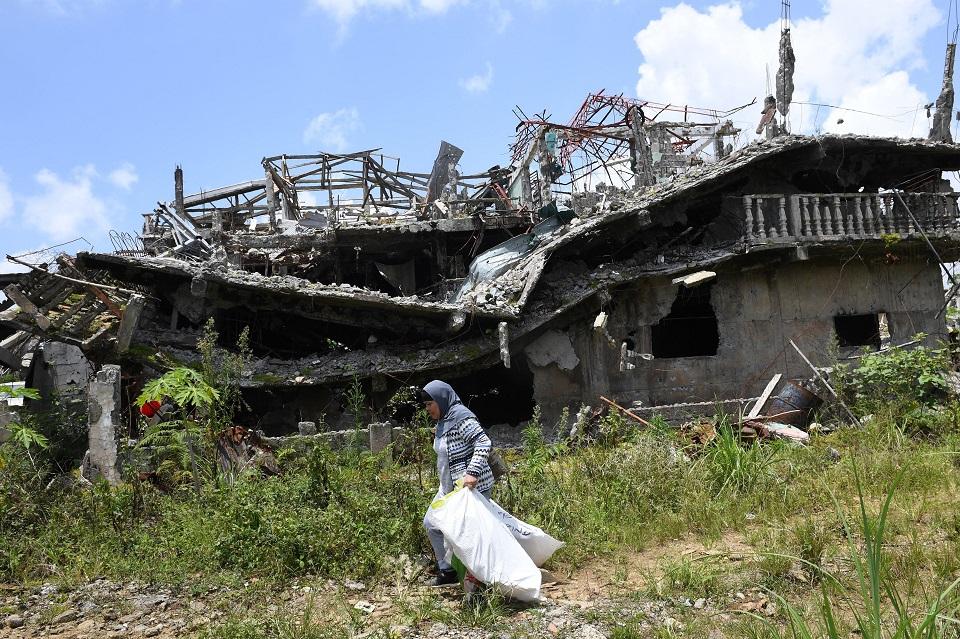Marawi siege victims shouldn’t get less than Martial Law claimants, compensation exec says

The compensation to be given to the victims of the Marawi City siege should not be less than what was provided to the victims of the Martial Law regime, an official said Thursday.
"The government provided compensation to the victims of the atrocities of the Marcos regime on a point system basis. If you are detained, that is more or less worth P175,000. If the victim died, that is 10 points, roughly P1.7 million for the heirs. This is the precedent," Human Rights Violations Victims' Memorial Commission Executive Director Carmelo Crisanto told GMA News Online in a virtual interview.
"We [in the Memorial Commission] will be part of the implementation of the Marawi compensation law, and such compensation should not be lower than P175,000," he added.
The Marawi Siege Victims Compensation Act of 2022, signed by then-President Rodrigo Duterte in April, aims to compensate those who suffered loss and destruction of property during the Maute terror group's months-long siege on the Islamic City of Marawi in 2017.
"The Marawi compensation bill compensates the victims because the victims were victimized by state forces [during gun battles against the Maute terrorists]; the victims were collateral damage. It is not the victims' fault that they were affected. We proposed the same [payment scheme used for the Martial Law regime victims] kasi iyong damages, binomba iyong lugar, namatayan ang mga tao [the places were bombed, people died]. It should be P1.7 million," Crisanto added.
Crisanto noted that the state's recognition of its liability in hurting its citizens by providing financial remuneration should not discriminate.
"Oo, malaking bagay ang P1 million sa namatayan, pero higit ba ang buhay ng ibang Pilipino sa isang Muslim? [Yes, P1 million for each death is a big deal, but are other Filipinos' lives worth more than those of Filipino Muslims?] The state should have parity when it enters into a compensation for the acts that the state did to its people," he added.
New claims board for ML victims
The Memorial Commission is the government agency mandated to implement the 2013 Human Rights Reparation and Recognition law, which provides financial remuneration to the victims of atrocities perpetrated during President Ferdinand Marcos Sr.'s regime, which includes the years when Martial Law was imposed nationwide. Under this law, the amount of compensation that each victim or heir will receive depends on the gravity of the human rights violation committed against them, which includes arbitrary detention, torture, sexual abuse, enforced disappearance, and death.
The payment for this compensation is sourced from the P10 billion recovered by the Philippine government from the Marcos family's Swiss bank accounts.
In the same interview, Crisanto said that the Memorial Commission is in favor of the proposal to pass a new law creating a new Claims Board that will grant compensation to the Martial Law victims.
Crisanto said that the 2013 Human Rights Reparation and Recognition law was only able to compensate around 11,000 or 14.4% of the 75,749 victims, because providing evidence of suffering that happened four decades ago cannot be extracted with plain questioning of facts and documents.
For instance, Crisanto said, a victim of sexual assault by soldiers with no identification on their uniforms might not be able to respond in detail as to who assaulted her, or when and where it happened.
These details, Crisanto said, are needed to get for them to receive compensation under the 2013 law.
"Any move to provide compensation to those hurt by the state is always a step in the right direction. The lessons I got from the first Claims Board is that there should be more people in the Board who are psychologists, psychiatrists, and mental health professionals. If you are a sexual assault victim and you survived to tell the tale, you will be asked, saan ka dinala? Sino ang testigo na ginahasa ka? [Where were you brought? Who can testify that you were raped?] In all of those questions, a victim would tend to say, 'wala po akong alam' ['I don't know']," he said.
"[That will be hard because] your claim will not be recognized because you are unable to fulfill some of the requirements for you to be given compensation. Offhand, the one asking the question will have the drive for truth. But if you are a psychologist, habang nag-uulat ang biktima, makikita na niya na kahit hindi ito i-lie detector test, nangyari itong pagdadakip at pangaabuso sa kanya [while the victim is recounting their experience, they will be able to tell that the abduction and abuse happened]," Crisanto added.
Crisanto said that in giving compensation and asking the victims to retell their suffering, the government should also help them process the trauma brought about by the retelling of their agony.
"There is a kind of truth telling where you retell your trauma. It is much easier to look at the documents when finding out what happened to many people, but listening to survivors, marami sa kanila, kinikimkim lang, pati sa asawa, hindi sinabi, o kahit sa kamag-anak [many of them suppress it, hide it even from their spouse or family]. For the government to ask them to come forward and relive their story...hindi iyong nakinig lang tayo tapos, tapos na [it shouldn't be just that we hear it and then it's done]," he said.
"We should be prepared to handle how they feel about retelling something traumatic. The Memorial Commission is mandated to document the stories of the survivors, and myself and my staff have nightmares over it. Paano pa kaya sila mismong biktima? [How much worse for the victims themselves?]" he added. — BM, GMA News

Need a wellness break? Sign up for The Boost!
Stay up-to-date with the latest health and wellness reads.
Please enter a valid email address
Your email is safe with us





